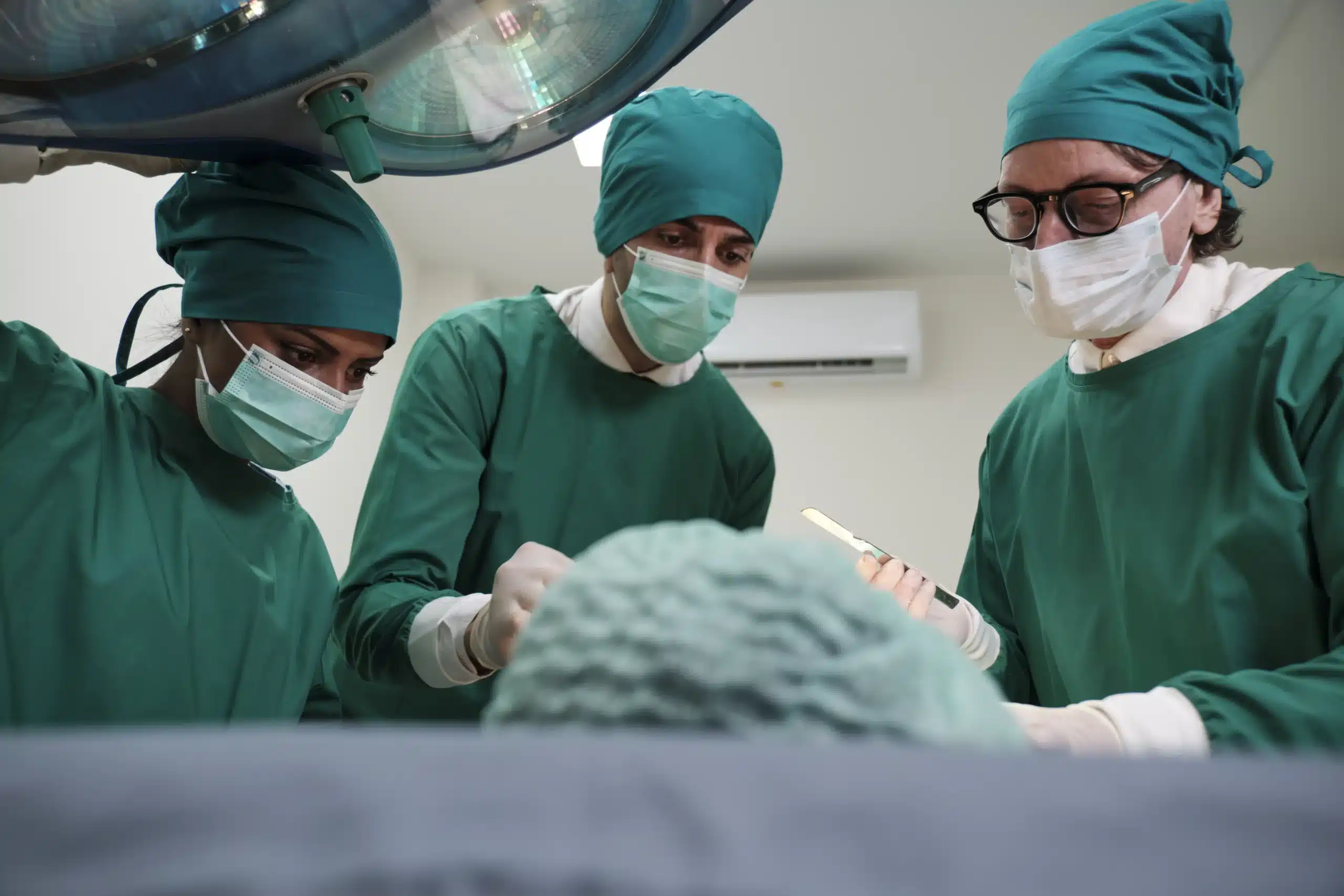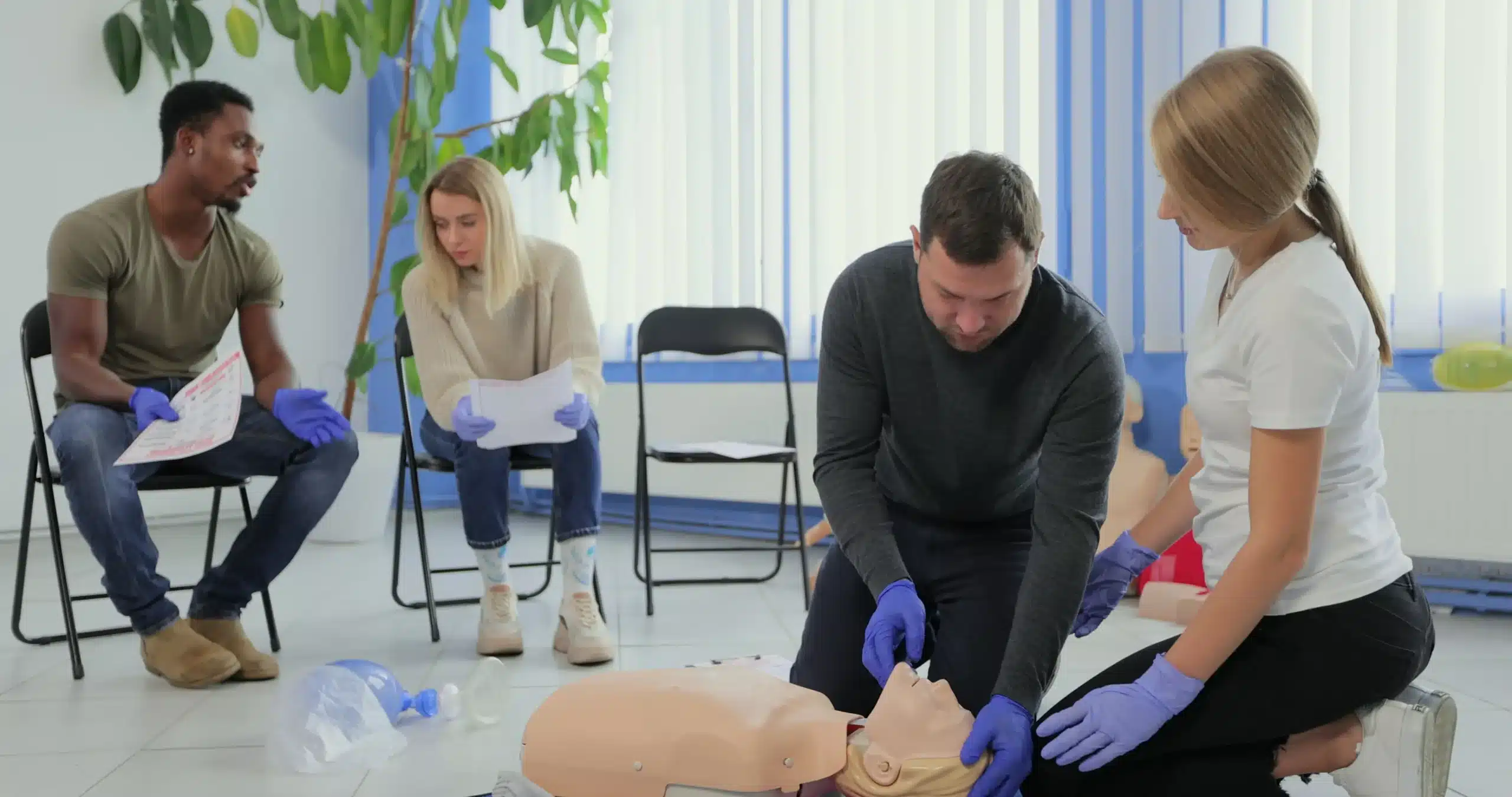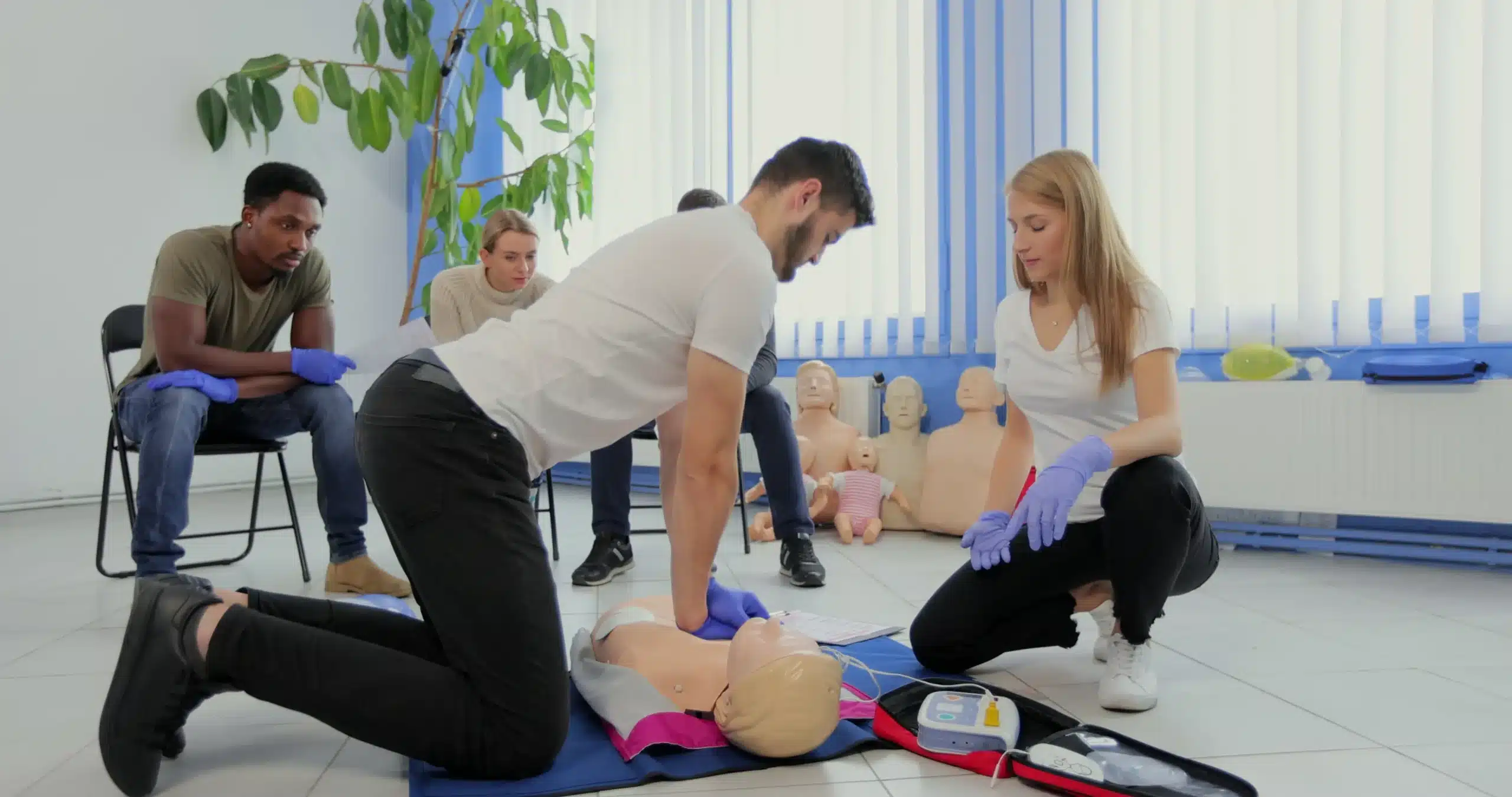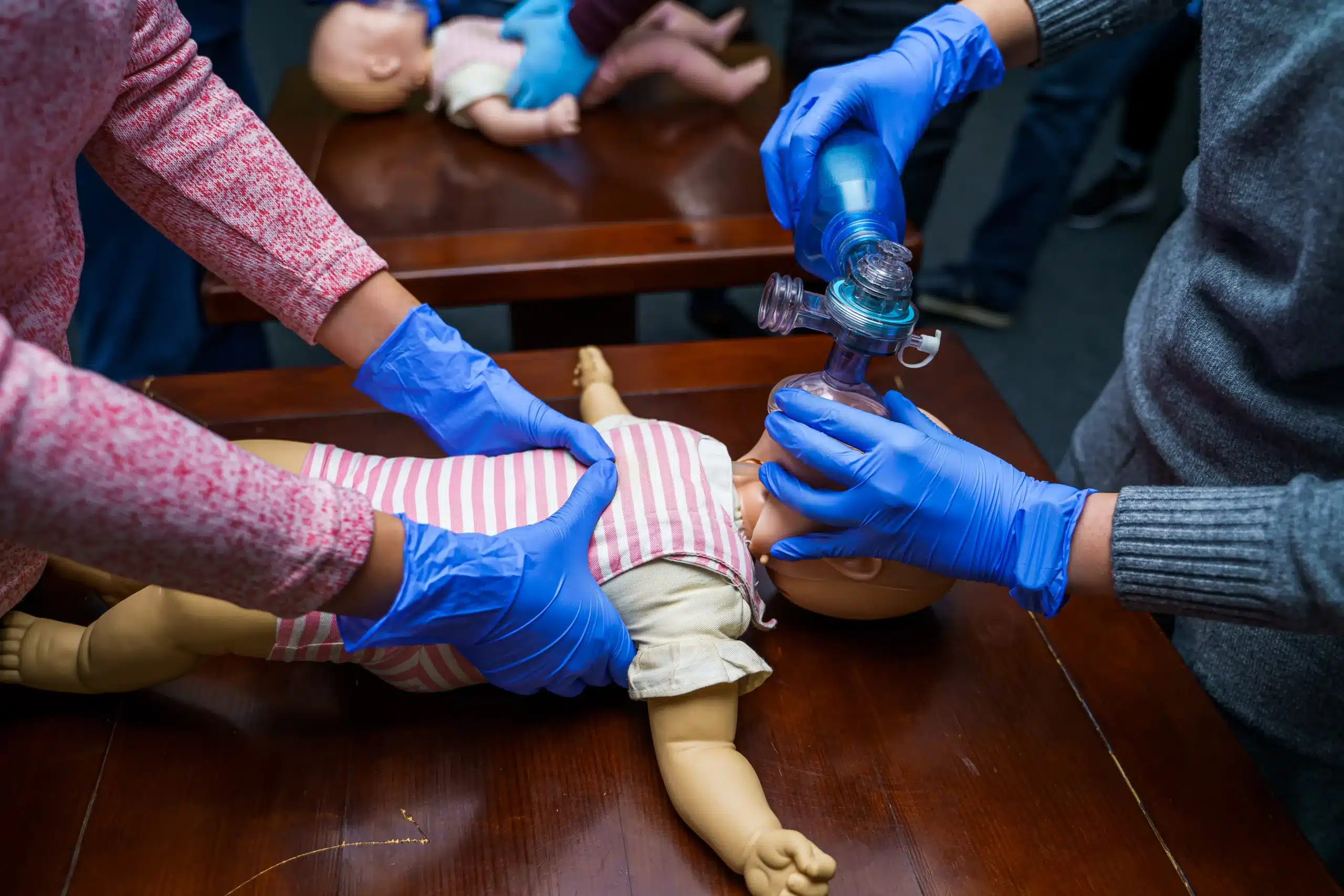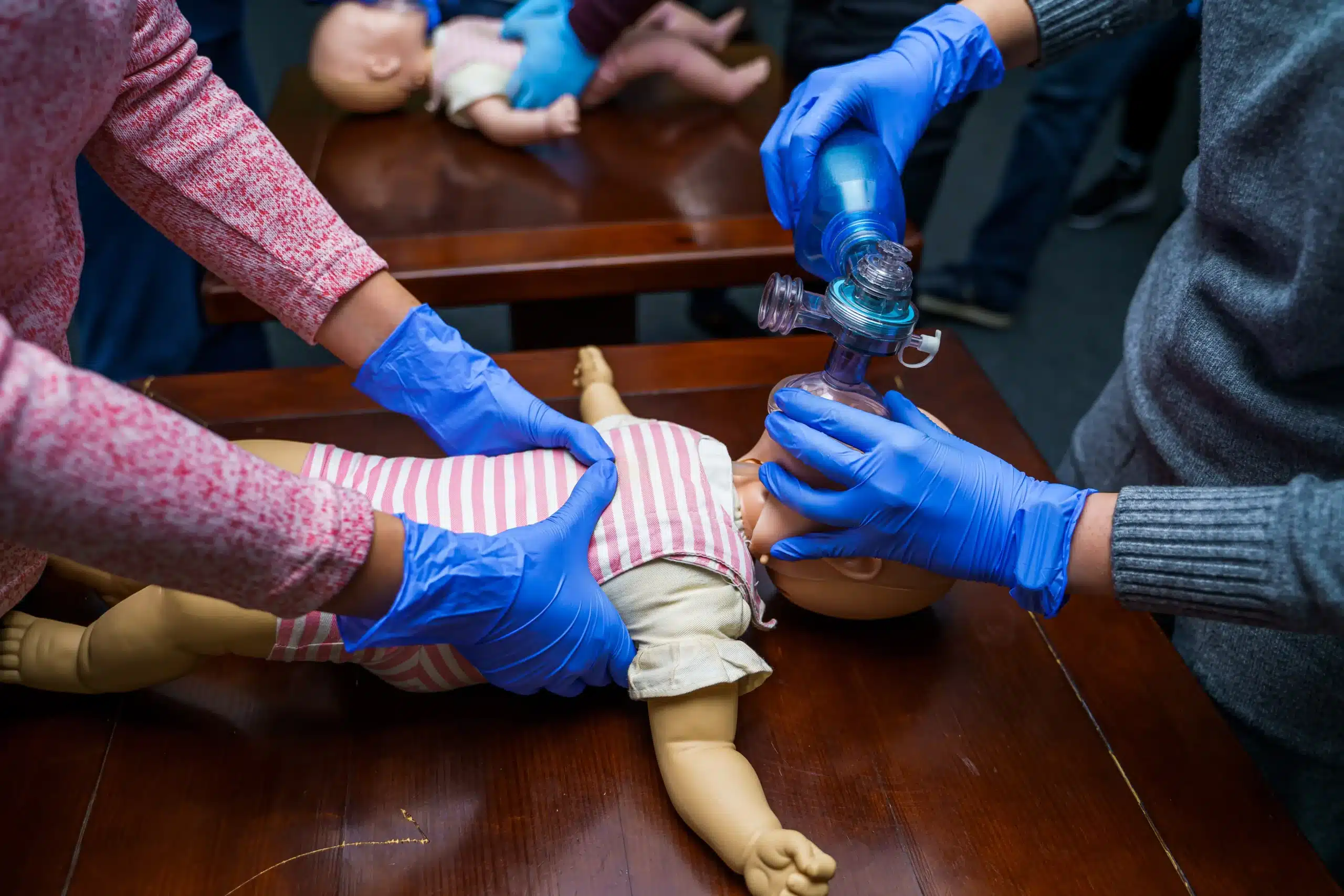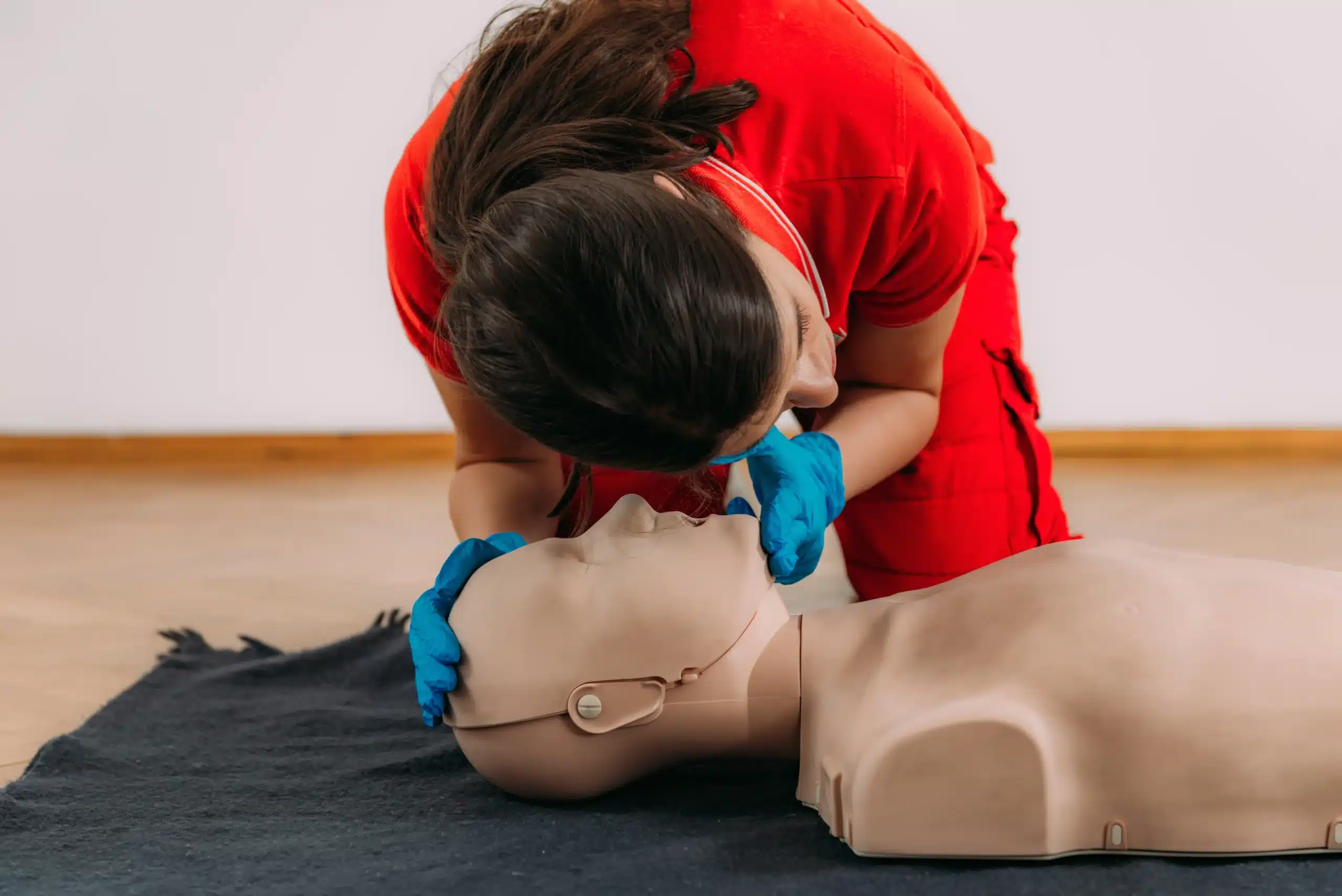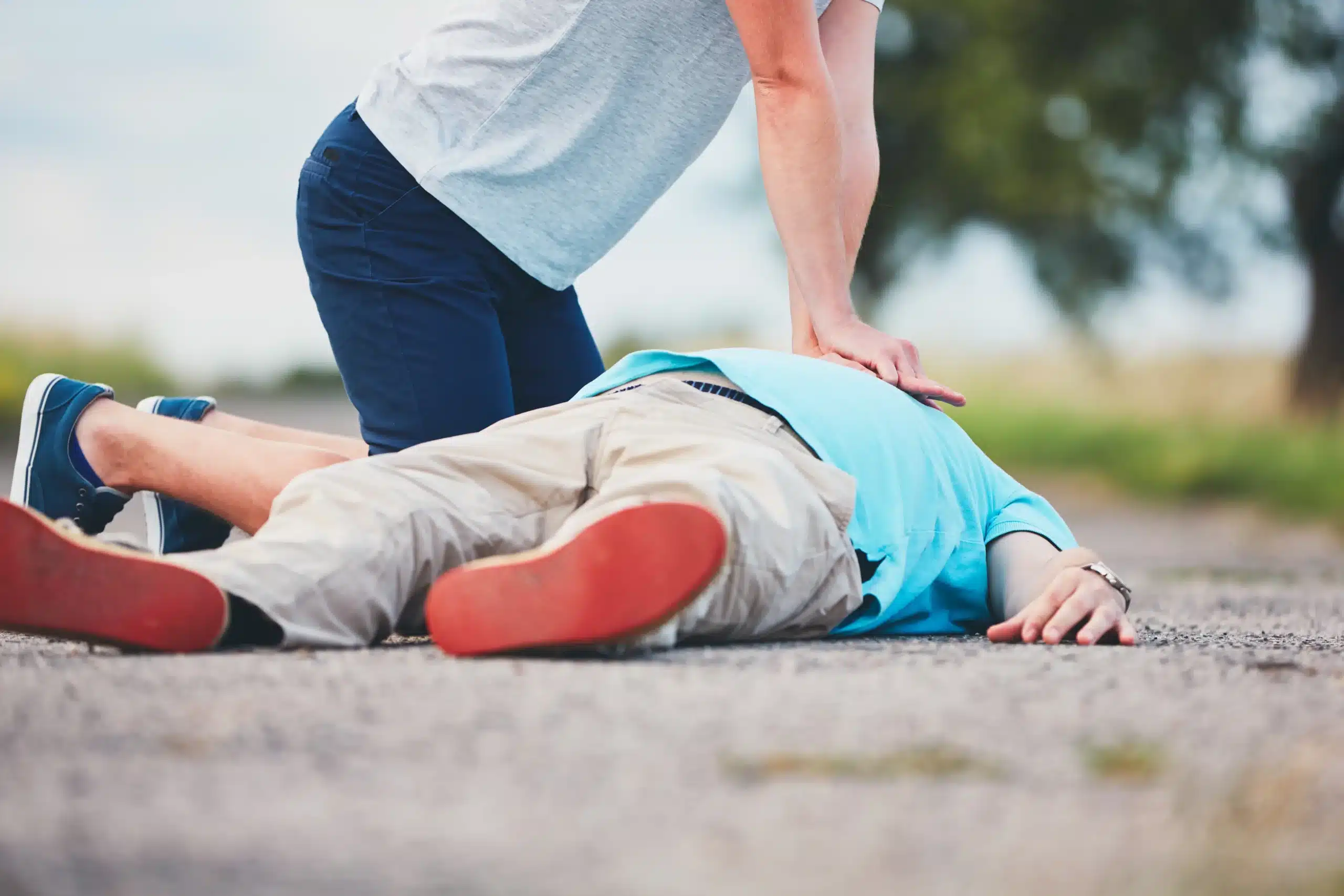CPR certification in Turlock equips you with the skills to respond confidently during medical emergencies. This guide explores the different types of CPR certification available in Turlock, including Basic CPR, BLS for Healthcare Providers, ACLS, and PALS. We’ll delve into where you can find these courses, the typical costs involved, and how long each course takes. We’ll also discuss the steps to register for a class, what happens during a CPR training session, and why getting CPR certified is a valuable asset, both personally and professionally. Finally, we’ll address some common misconceptions about CPR certification, empowering you to make informed decisions about your training.
Key Takeaways
- Find the right CPR class for you: Explore options ranging from basic CPR to advanced certifications like ACLS and PALS, and choose a course that aligns with your current skills and goals.
- CPR training is accessible in Turlock: Organizations like Merced CPR Classes and Safety Training Seminars offer various courses, often with flexible scheduling and competitive pricing.
- Become a vital community member: Learning CPR empowers you to respond effectively in emergencies, contributing to a safer environment for everyone.
What is CPR Certification in Turlock?
CPR certification in Turlock gives you the skills to respond to cardiac arrest and other emergencies where breathing or heartbeat has stopped. It involves learning the techniques of cardiopulmonary resuscitation (CPR) and often includes training on using an automated external defibrillator (AED). This training is critical because quick action can significantly improve someone’s chances of survival. Several organizations, including the American Heart Association (AHA), offer CPR certification courses covering essential techniques and guidelines. These courses empower you to act confidently in emergencies, potentially saving a life. While similar courses are offered in nearby Merced, Turlock CPR certification focuses on serving the specific needs of the Turlock community. For those interested in learning more about options in Merced, you can explore CPR classes in Merced. CPR training is valuable for anyone in Turlock, whether you’re a healthcare professional, a concerned citizen, or simply want to be prepared for the unexpected.
CPR Certification Classes: What’s Available?
CPR certification classes in Turlock cater to various skill levels and professional needs. Whether you’re a healthcare provider, a concerned community member, or seeking career advancement, there’s a course designed for you. Let’s explore the different types of CPR certification available:
Basic CPR
Basic CPR training provides the foundational skills needed to respond to cardiac emergencies. These courses cover essential techniques like chest compressions, rescue breaths, and how to recognize the signs of a heart attack or stroke. Basic CPR certification is a great starting point for anyone looking to learn life-saving skills, and it’s often a prerequisite for more advanced certifications. You’ll learn how to perform CPR on adults, children, and infants, giving you the confidence to act in various emergency situations.
BLS for Healthcare Providers
BLS (Basic Life Support) certification goes a step further than basic CPR, equipping healthcare professionals with the skills to respond to life-threatening emergencies in a clinical setting. BLS training covers high-quality CPR for adults, children, and infants, along with the use of an AED (Automated External Defibrillator). It also emphasizes effective ventilation techniques, team resuscitation strategies, and how to relieve choking. This certification is crucial for doctors, nurses, paramedics, and other healthcare providers. You can find BLS courses for healthcare providers at various training centers.
ACLS for Advanced Practitioners
ACLS (Advanced Cardiac Life Support) certification is designed for advanced medical professionals who manage cardiac arrest and other cardiovascular emergencies. ACLS training often utilizes the American Heart Association RQI (Resuscitation Quality Improvement) program, a comprehensive approach to maintaining and improving resuscitation skills. This certification delves into advanced airway management, pharmacology, and electrocardiogram (ECG) interpretation. It’s essential for physicians, nurses, paramedics, and respiratory therapists who work in critical care settings. Consider exploring ACLS certification options to enhance your skills.
PALS for Pediatric Care
PALS (Pediatric Advanced Life Support) certification focuses on the specialized skills needed to respond to life-threatening emergencies in infants and children. PALS courses cover pediatric-specific CPR techniques, airway management, and treatment protocols for common pediatric emergencies. This certification is vital for pediatricians, pediatric nurses, emergency medical technicians, and other healthcare providers who work with children. PALS training is available through various organizations.
Where to Find CPR Training in Turlock?
Finding the right CPR training in Turlock is easier than you think. Several organizations offer comprehensive courses to equip you with these life-saving skills. Here are a few options:
Merced CPR Classes
Merced CPR Classes offers a variety of American Heart Association (AHA) certification courses—including BLS, ACLS, PALS, and First Aid—right here in Turlock. They’re known for their commitment to customer service and a low-price guarantee, making quality training accessible. Check out their group discounts if you’re training with a group. Before your class, take a look at their course prep page. You can also find more information on their BLS and ACLS courses.
Safety Training Seminars
Safety Training Seminars is another excellent choice for AHA-certified courses in Turlock. They provide BLS, ACLS, PALS, CPR, and First Aid training throughout the week, offering flexible scheduling. They focus on delivering high-quality instruction to prepare you for emergencies.
First Lady Permanente
For a broader range of medical training programs, consider First Lady Permanente. They offer various certifications in the Central Valley, including Turlock, Modesto, and Merced. While their website doesn’t specifically list CPR, it’s worth contacting them directly to inquire about potential courses or related programs.
Community Centers and Hospitals
Often, local community centers and hospitals offer CPR training to the public. The Turlock City Fire Department provides CPR classes to residents. Contacting your local community center or hospital is a good starting point to discover CPR training options in your area.
Cost of CPR Certification
CPR certification costs vary depending on the training level and location. Understanding the different price points will help you budget for your certification.
Course Prices
Basic CPR classes are generally the most affordable. More advanced courses like ACLS (Advanced Cardiovascular Life Support) and PALS (Pediatric Advanced Life Support) are typically more expensive. Basic courses can range from $50 to $90, while specialized certifications like BLS for Healthcare Providers might cost between $70 and $100. For a real-world example, you can review First Lady Permanente’s pricing, which includes a discount for their students and an additional fee if you need the required AHA BLS textbook. Always check with the specific training center for their most up-to-date pricing.
Group Discounts & Special Offers
Many CPR training centers offer discounts for group bookings. This is a smart option for businesses, schools, or community groups wanting to certify multiple people. Merced CPR Classes offers on-site group training, serving a wide area, including Modesto, Merced, Sacramento, and the Bay Area. Contact your chosen provider to see if they offer group discounts or other special promotions.
Merced CPR Classes’ Low Price Guarantee
Merced CPR Classes offers a low price guarantee, demonstrating their commitment to affordable training. They strive to have the most competitive prices in Stanislaus County, making CPR certification accessible to everyone. Compare their prices with other local providers if you’re looking for cost-effective training.
How Long Do CPR Courses Take?
Knowing the time commitment for CPR training helps you plan and choose the right course. The length of a CPR class depends on the certification level and the specific skills covered.
Basic CPR Class Length
Basic CPR classes typically last between two and four hours. These courses cover the fundamentals of CPR, including chest compressions and rescue breaths. You’ll learn how to recognize the signs of a cardiac emergency and respond effectively. A basic CPR certification is a great starting point for anyone wanting to learn these essential skills.
BLS, ACLS, & PALS Time Commitment
More advanced certifications like Basic Life Support (BLS), Advanced Cardiovascular Life Support (ACLS), and Pediatric Advanced Life Support (PALS) require a greater time investment. BLS courses usually take between four and eight hours to complete. ACLS and PALS certifications are more specialized and typically range from eight to sixteen hours. These courses cover more complex procedures and are often geared towards healthcare providers. You can find more information on preparing for these courses. For those looking for cost-effective options, Merced CPR Classes offers a low price guarantee on all our courses. We also offer discounts for group classes, making these essential certifications accessible to everyone.
Register for CPR Classes: How-To
So, you’re ready to learn CPR? Great! This section walks you through registration, what to expect, and how to prepare.
Steps to Register
Registering for a CPR class in Turlock is straightforward. Many providers, including Merced CPR Classes, offer streamlined online registration. Check their website for class schedules and follow the steps to enroll. Classes are typically offered daily, giving you flexibility to find a convenient time.
Age & Experience Requirements
Most CPR and First-Aid certification courses are designed to be accessible to everyone. While there aren’t usually strict age requirements, you should be able to understand the course material and physically perform the techniques. Courses typically take one to two days, depending on the program and provider. Find a class that fits your schedule.
Materials & Online Components
Before class, it’s helpful to understand the materials and any online components. Some providers, like those offering the American Heart Association curriculum, may require online coursework. Double-check if you’ll need a computer or tablet, as smartphones might not be compatible. You might also need a specific textbook, like the AHA BLS textbook (ECC2020 edition). Inquire about textbook requirements and associated costs when you register. Some providers, like First Lady Permanente, may offer student discounts. Understanding these details upfront helps you prepare. Merced CPR Classes offers clear information on course preparation.
What Happens in a CPR Class?
Curious about what goes on during CPR training? Classes typically combine instruction, hands-on practice, and assessment to get you ready for real-life emergencies. Here’s a peek inside:
Instruction & Hands-On Practice
Certified instructors lead CPR classes, guiding you through each step. Expect a blend of lectures, demonstrations, and hands-on practice. Instructors often use visual aids and real-life scenarios to illustrate the concepts. You’ll learn proper techniques for chest compressions, rescue breaths, and how to spot the signs of a cardiac arrest. Active participation is essential, so be prepared to engage and ask questions. Some courses, like those at Elite Medical Training, even include simulations to mimic real emergencies.
Equipment: AEDs & Mannequins
CPR training involves hands-on work with equipment like AEDs (automated external defibrillators) and medical mannequins. You’ll practice using an AED, learning how to place the pads and respond to the device’s instructions. Working with realistic mannequins helps you develop the muscle memory and coordination you’ll need for effective compressions and breaths. Comprehensive CPR training covers various situations, including adult, child, and infant CPR, plus how to help someone who’s choking.
Assessment & Certification
Most CPR classes include an assessment to make sure you’ve mastered the techniques. This usually involves demonstrating your skills on a mannequin for the instructor. After successfully completing the course, you’ll receive an official American Heart Association certification card, valid for two years. Some training centers, such as the First Lady Permanente Education Center, also send an electronic certificate via email from heart.org within 48 hours. This certification proves your CPR competency and is often a requirement for certain jobs or volunteer opportunities.
Why Get CPR Certified?
Getting CPR certified isn’t just about acquiring a skill; it’s about empowering yourself and contributing to a safer community. Whether you’re driven by professional goals, a desire to be prepared, or a sense of civic duty, CPR certification offers numerous benefits.
Career Advancement
CPR certification can significantly enhance your career prospects. Many professions require it, including roles in healthcare, education, and childcare. For aspiring healthcare professionals, CPR certification is often a prerequisite. Even outside the medical field, employers value employees trained to handle emergencies. Some high schools even require students to complete CPR training before graduation, giving them a head start in their careers. If you’re looking to advance in your current role or explore new opportunities, CPR certification can give you a competitive edge.
Emergency Preparedness
Knowing CPR equips you to respond effectively in a medical emergency. CPR helps maintain vital blood flow to the brain and other organs until professional medical help arrives. This immediate action can dramatically improve the chances of survival, especially in cases of cardiac arrest. Learning CPR provides the confidence and skills to act quickly and potentially save a life. It transforms you from a bystander into a first responder, ready to make a difference when it matters most. CPR classes cover essential techniques and provide hands-on practice so you’ll feel prepared to handle real-life situations.
Community Safety
CPR-trained individuals contribute to safer communities. Bystanders are often the first on the scene of an emergency. Having the skills to perform CPR can bridge the gap before paramedics arrive, significantly impacting outcomes. CPR and first-aid training strengthens community resilience, creating a network of people prepared to assist in times of need. Studies show that immediate CPR can double or triple a cardiac arrest victim’s survival rate, highlighting the profound impact of community-based CPR training. By getting certified, you become a valuable asset to your community, ready to provide critical assistance when it’s needed most.
Keep Your CPR Certification Current
Knowing how to perform CPR can make you a valuable asset in an emergency. But just like any important skill, CPR requires a refresher every so often. Staying up-to-date ensures you’re ready to respond effectively when it matters most. Let’s break down what you need to know to keep your certification current.
Renewal Requirements
CPR certifications, like those offered by Merced CPR Classes, are typically valid for two years. You’ll receive an official American Heart Association certification card upon completion of your course, clearly stating the expiration date. To continue providing CPR, you’ll need to renew your certification before it expires. This involves retaking the course to demonstrate continued competency and familiarity with the latest guidelines. Don’t let your skills lapse – mark your calendar and plan for your renewal.
Continuing Education
While CPR training provides essential life-saving skills, it’s important to understand the distinction regarding continuing education units (CEUs). Most CPR courses don’t offer CEUs, except for specific cases like those with a California dental license. So, while you’ll gain practical knowledge and confidence in your abilities, these courses might not provide formal educational credits applicable to other professional certifications. If you’re looking for CEU opportunities, check with your licensing board or professional organization for approved courses. For more information on BLS courses for healthcare providers, visit First Lady Permanente.
Guideline Updates
CPR techniques and best practices evolve with ongoing research and medical advancements. Staying informed about these changes is crucial for providing effective and safe CPR. Reputable CPR courses, including those offered through Merced CPR Classes, adhere to the latest guidelines, such as the 2020 AHA CPR & ECC Guidelines. By renewing your certification, you’ll learn the most current protocols, ensuring you’re prepared to handle real-life emergencies with confidence and the best possible techniques. Review the course preparation materials to familiarize yourself with the content.
CPR Certification Myths
Let’s clear up some common misconceptions about CPR certification. These myths can prevent people from learning this life-saving skill, so let’s set the record straight.
“Only Certified Individuals Can Perform CPR”
It’s a dangerous myth that only certified individuals can perform CPR. Anyone can and should perform CPR in an emergency. Immediate action can dramatically increase the chances of survival during cardiac arrest. While training provides valuable knowledge and skills, the most important thing is a willingness to help. Don’t hesitate to act if you encounter someone in need.
“CPR Always Saves Lives”
CPR is a powerful tool, but it’s not a guaranteed lifesaver. While it’s crucial for maintaining blood flow and oxygen to the brain until medical professionals arrive, CPR doesn’t always revive someone in cardiac arrest. Many factors influence the outcome, including how quickly CPR begins and the underlying cause of the cardiac arrest. Even if the outcome isn’t what we hope for, providing CPR significantly improves a person’s odds.
“CPR Training is Too Expensive”
Cost shouldn’t be a barrier to learning CPR. This life-saving skill is accessible and often more affordable than people think. Many organizations, including Merced CPR Classes, offer courses at reasonable prices, sometimes with group discounts. Check with your local community centers, hospitals, or training providers for options that fit your budget.
“You Need to Be a Medical Professional”
You absolutely do not need to be a doctor or nurse to learn CPR. CPR training programs are designed for everyone, empowering everyday people to respond effectively in emergencies. Regardless of your background, learning CPR equips you with the skills to potentially save a life.
Related Articles
- CPR Certification in Merced: Your Complete Guide – Merced CPR Classes
- Why CPR is Important in Healthcare – Merced CPR Classes
- Why CPR and First-Aid Training is Essential at Work
- BLS ACLS Classes in Merced CA: Your Guide – Merced CPR Classes
- Online PALS Classes in Turlock: Your Guide – Merced CPR Classes
Frequently Asked Questions
What if I live in Atwater? Can I still take CPR classes with Merced CPR Classes? Absolutely! Merced CPR Classes serves the surrounding areas, including Atwater. They’re a great option whether you’re in Merced, Turlock, or Atwater. Check their website for class schedules and locations.
I’m not a healthcare professional. Is CPR certification still relevant for me? Definitely! CPR certification is valuable for everyone, not just medical professionals. Knowing CPR empowers you to help family, friends, or even strangers in an emergency. It’s a life skill that can make a real difference.
How can I find CPR classes that fit my busy schedule? Many CPR training providers offer classes throughout the week and even on weekends to accommodate busy schedules. Check with providers like Merced CPR Classes or Safety Training Seminars for their schedules and see what works best for you. Online registration often makes signing up quick and easy.
My CPR certification is about to expire. What do I need to do? You’ll need to retake the CPR course to renew your certification. Contact the organization that provided your original training to find out about renewal courses and procedures. It’s important to keep your skills current to ensure you’re prepared for an emergency.
I’m nervous about performing CPR in a real emergency. How can I feel more confident? It’s completely normal to feel nervous, but remember that any action is better than no action. CPR training provides the skills and practice you need to build confidence. Focus on what you’ve learned, and trust your training to guide you. Regularly reviewing the material and even practicing with friends or family can also help you feel more prepared.
